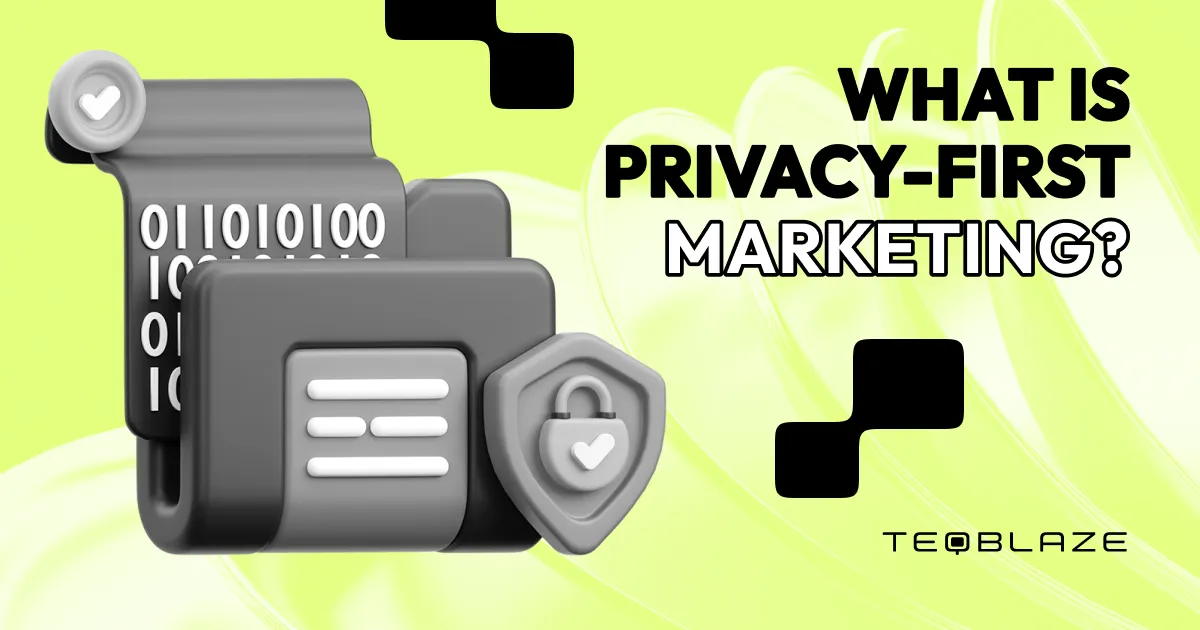In recent years, the privacy-first approach in marketing has emerged as a critical strategy for businesses across domains, particularly small and medium enterprises. With 63% of Internet users feeling that most service or product providers lack transparency about data usage and 48% ceasing to shop with businesses due to privacy concerns, consumer awareness and vigilance around data privacy in marketing are rising.
At the same time, regulations such as the General Data Protection Regulation (GDPR) enforce stricter guidelines on how businesses collect, use, and store user data. What does that mean for your business? Simply put, you need to make sure your data collection and use practices do not violate any regional regulations while delivering an exceptional quality of service to the customers and clients.
Before diving deeper, let’s explore what privacy-first marketing entails and how regulations shape it.
What is data privacy in marketing?
Data privacy in marketing refers to an individual's right to control how, when, and to what extent their personal information is shared or disclosed. This information may include details such as their name, address, contact information, or behavioral patterns — whether online or in real life. Data protection regulations, thus, empower people to decide the circumstances under which their data can be accessed and used and defend their right to privacy in cases of violations.
Privacy-first approach to marketing emphasizes safeguarding personal data while fostering meaningful engagement. Picture this: you own a local candy shop and want to share updates about your newest lollipop creation through email. Rather than blasting the same message to your entire contact list, a privacy-first strategy would involve asking customers about their specific preferences — like their favorite flavors or types of candies — and then crafting personalized emails that align with their interests. This method not only respects their privacy by adhering to their consent but also enhances their experience through tailored communication. Ultimately, privacy-first marketing is about cultivating trust and loyalty by prioritizing your customers’ privacy choices and delivering value in a way that feels personalized and respectful.
Why privacy-first marketing matters?
Although not the first data privacy regulation, the GDPR set the standard as the first comprehensive, modern data privacy law when it came into effect in 2016. Sparked by rising concerns over data breaches and unethical handling of personal information, it paved the way for similar regulations worldwide, such as California’s CCPA/CPRA and Brazil’s LGPD.
Importantly, these laws can apply to your business even if it’s not physically located within the relevant jurisdiction. For instance, a Texas-based company selling digital products across the U.S. must comply with the CCPA/CPRA if it processes the personal data of 100,000 or more California residents.
Compliance hinges on treating consumer data as their property; using it requires explicit permission. While this approach fosters trust and minimizes legal risks, it raises a key concern for marketers: does prioritizing privacy comes at the cost of valuable marketing insights?
Traditional marketing tactics that rely on third-party data and invasive tracking are rapidly losing effectiveness and can pose significant risks. Businesses that fail to embrace privacy-first principles risk not only regulatory penalties but also a loss of consumer trust and damage to brand reputation.
Here’s why adopting a privacy-first marketing strategy is essential for your business:
Building trust and fostering loyalty
Modern consumers value transparency and control over their data. By prioritizing privacy, you show genuine respect for your customers, strengthening trust and nurturing long-term relationships. This trust can translate into increased loyalty and repeat business. Show the customers that you care about their privacy, let them know, and they will pay back with mutual respect and trust.
Gaining a competitive edge
As privacy regulations expand, businesses that proactively adopt privacy-first practices can position themselves as leaders in the market. Being seen as trustworthy and forward-thinking can help attract a broader, more loyal customer base.
Reducing risks
Data breaches and privacy violations can result in severe financial and reputational damage. Implementing strong privacy measures not only protects sensitive information but also safeguards your business’s reputation and future growth.
By establishing robust privacy-first practices, you benefit your business as well as your customers. This is a two-way street that gives mutual confidence and trust to both parties.
Cookies and privacy-first marketing
To successfully adopt a privacy-first approach to marketing, one technology marketers must fully understand is cookies.
What are cookies and what do they do?
Cookies are small text files stored in a visitor’s browser, either by the website they visit or by third-party partners. While third-party cookies are being phased out, cookies as a whole remain a key tool for tracking user behavior and personalizing digital experiences. Here's a closer look at how they work and why they matter.
Cookies allow website owners to monitor user activity, such as:
The previous website the user visited.
Whether they are a new or returning visitor.
Pages viewed and buttons clicked within the same domain.
Advertisers use cookies to serve tailored ads based on browsing and search history. Retailers also rely on cookies to remember the items users click on or add to their cart, improving convenience and boosting conversions.
Why do cookies matter to marketers?
Cookies provide vital insights that help marketers:
Retarget users who previously visited their website.
Measure campaign performance and adjust strategies accordingly.
Assess how website changes influence user behavior.
In short, cookies are the backbone of data-driven digital marketing, offering the information needed to optimize campaigns and enhance user experiences.
The privacy challenge
Using cookies inherently involves collecting consumer data. While this raises privacy concerns, some types of cookies (such as first-party cookies) offer more privacy-friendly options. Marketers can ensure their cookie practices are both ethical and compliant by:
Clearly explaining cookie usage and obtaining user consent.
Collecting data directly from users via their own platforms rather than relying on third-party cookies.
Adopting privacy-compliant tools and respecting user preferences.
By rethinking their use of cookies, marketers can balance the need for valuable insights with respect for consumer privacy.
5 Best practices for privacy-first marketing strategy
Implementing a privacy-first marketing strategy requires a thoughtful approach that balances compliance, user trust, and business goals. Naturally, we start with a strong foundation, as it is the start that matters most in such complex, long-term initiatives. Let us take you through the most important steps to building a strong privacy-first strategy.
Building a strong foundation while prioritizing privacy
Privacy and marketing campaign performance don’t have to be at odds. With AI-powered solutions, businesses can achieve both, leveraging advanced predictive and analytical tools to boost ROI while addressing the challenges posed by the decline of third-party cookies.
Adopting first-party data can be a powerful solution for building a robust basis for your strategy. Focus on collecting data directly from your customers with their consent will also be beneficial for building trust. You should also clearly communicate how the user’s data will and won’t be used.
Studies show that prioritizing privacy can enhance customer perception; for example, one survey revealed that 43% of consumers would switch to a second-choice brand if it offered a better privacy experience.
First-party data provides a clearer and more reliable view of the customer journey, so it is only reasonable for you to leverage it. It enables more accurate measurement, filling the gaps left by the absence of third-party cookies. Incorporating privacy principles can set your business apart, unlocking both consumer trust and higher returns.
Drive smart marketing decisions with a data-driven strategy
Collecting privacy-first data is just the beginning. The next step is leveraging AI-powered insights to uncover what truly works. For instance, tools like the Insights page in Google Ads use AI to predict emerging search trends, analyze performance shifts, and identify untapped audience segments that fall outside your typical customer profiles.
These insights provide a deeper understanding of customer behavior and ad engagement, enabling more meaningful connections with your audience. By combining first-party data with AI-driven insights, marketers can make informed decisions that lead to better ROI and stronger business outcomes.
Choose the right software
The next step is selecting the right tools to execute it effectively. Here are the key considerations when evaluating marketing software. Data privacy and marketing technology (Martech) don’t always go hand-in-hand, so it’s essential to evaluate how your third-party vendors manage the data you collect. Even if your own practices are compliant, mishandling by vendors can still expose you to liability under data privacy regulations. To make smarter technology choices, it’s also important to understand how AdTech and MarTech platforms intersect and differ—especially when it comes to data collection, targeting, and personalization. While both are essential to digital growth, each has unique privacy implications marketers must navigate. If you’re unsure how they compare, we’ve broken it down in our AdTech and MarTech article to help you align the right tools with your compliance goals
If you have a privacy expert on your team, they should be actively involved in assessing vendors’ data privacy practices. If not, consider using a vendor monitoring solution that can help you quickly assess the compliance track record of your martech tools.
Balance compliance with usability
Data privacy tools must do more than simply support compliance. They should also minimize disruption to your daily operations. Marketing teams are often responsible for the company website, so any data privacy issues, whether marketing-related or not, typically fall under their purview.
As you evaluate tools, consider how they will impact your workflow. Ask the following questions to assess both the functionality and the ease of integration:
Will this tool affect website load times?
How complicated are the integrations with tracking systems like Google Tag Manager?
Does the tool provide a built-in cookie consent management platform, or will you need to handle consent banners for each jurisdiction?
Can it support other privacy-related tasks, like data subject access requests (DSARs), which may become part of your responsibilities later on?
By choosing the right software, you ensure that compliance is seamlessly integrated into your marketing strategy without unnecessary complexity or delays.
Experiment, learn, and succeed
In a dynamic marketplace, a culture of testing and experimentation is essential for B2B companies to stay ahead. What worked yesterday might not deliver results tomorrow. By continuously testing, learning, and refining, you can optimize campaigns, reduce costs, and gain a competitive edge.
Take a holistic approach to performance: Evaluate how campaigns influence upper-funnel metrics like brand health, reputation, and awareness.
Balance short-term and long-term goals: Beyond short-term wins, you should try to accomplish long-term objectives through brand reputation, differentiation, and relevance for your core audiences.
Use brand lift testing: Whether through LinkedIn's native tools or partner-supported solutions, brand lift testing lets you establish a baseline, measure impact, and optimize campaigns for better results.
Run A/B tests: Compare two versions of a campaign to see which message or tactic resonates more effectively. This not only boosts performance and ROI but also provides valuable insights to inform future strategies.
By fostering a test-and-learn mindset, you can discover what resonates best with your audience and create campaigns that drive both immediate results and long-term brand growth.
Consider Teqblaze your trusted partner
TeqBlaze is a leader in privacy first marketing, offering advanced, customizable AdTech solutions that put user privacy and data protection at the forefront. As the digital advertising domain expands and evolves, especially with third-party cookies being pushed out, TeqBlaze helps clients navigate these changes effectively.
Our expertise includes:
Custom Programmatic Platforms: TeqBlaze creates and implements white-label programmatic platforms tailored to the unique needs of each client, ensuring efficient and scalable advertising operations.
Privacy-First Solutions: Focused on safeguarding first-party data and user privacy, TeqBlaze provides solutions that allow publishers and advertisers to maintain effective strategies while adapting to a privacy-centric ecosystem.
Innovative AdTech Development: Leveraging years of industry expertise, our team develops cutting-edge technologies that enhance monetization and addressability for publishers.
Global Reach and Support: With solutions that work across diverse channels (web, CTV, audio, and in-app environments) TeqBlaze offers comprehensive support to clients worldwide.
By emphasizing privacy in marketing, TeqBlaze ensures our clients can thrive in the dynamic digital advertising industry. The privacy-first approach is a natural part of our best practices, and the Teqblaze team excels at delivering AdTech solutions that ensure marketing campaign performance as well as strict data privacy regulation compliance.
Final word
Protecting consumer data while still enabling effective advertising in B2B requires the right strategies and tools. This is where reliable partnerships with trusted AdTech leaders, like Teqblaze, become invaluable assets that drive growth and prevent risks. Their expertise in crafting customizable, privacy-first solutions enables businesses to navigate regulatory challenges, safeguard user data, and optimize advertising performance compliantly and efficiently.
Furthermore, in an era of increasing data breaches and privacy violations, marketing data security plays a crucial role in maintaining trust and preventing costly errors. By working with industry leaders who prioritize privacy and security, businesses can avoid fallacies and ensure that their advertising efforts not only meet compliance standards but also build lasting relationships with their customers. With the right privacy-first marketing technology stack and trusted partners, brands can thrive in a privacy-conscious world while delivering personalized, effective marketing experiences.

 Grigoriy Misilyuk
Grigoriy Misilyuk Anna Vintsevska
Anna Vintsevska






